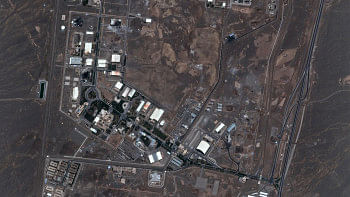All bets are off on Hefazat

Bangladesh's most influential and powerful Islamist pressure group, Hefazat-e-Islam, witnessed a dramatic upheaval earlier this month. Its centenarian founder, Shah Ahmad Shafi, died hours after he was forced to relinquish power in Hathazari Madrasa, the de facto headquarters of the Hefazat where he ruled for decades.
Faced with unprecedented student protests, Shafi was first forced to expel his son Anas Madani from the institution before stepping down himself. In the media, the agitations and the subsequent fall of Shafi were attributed to Junaid Babunagari, the group's defiant secretary-general.
But there were several other reasons too. Students had genuine frustrations at the mismanagement of the Madrasa, internal strife among teachers and officials, corruption allegations in the Madrasa exams, and an increasingly intolerant Anas Madani.
The context of the protest
Albeit under his father's shadow, Anas Madani was a key player himself. He was instrumental to Hefazat's rapprochement with the government. After Hefazat's massive rally in 2013, the government employed every trick in the book to tame the Deoband-influenced religious group.
In a classic stick and carrot approach, authorities have used criminal cases and other forms of legal harassment like punishment and largesse (such as money and lucrative public lands) as rewards. The scheme has produced stunning results. Although some such as Babunagari and Nur Hossain Kashemi (the Dhaka chief) remain defiant to pressure, others such as Madani and Mufti Faizullah willingly or reluctantly acceded.
But of course, for the government, the success did not come without a cost. It had to amend the national curriculum to remove certain articles and poetry written by secular writers, soften the age restrictions designed to prevent child marriage, relocate the statue of justice to a less prominent place in the Supreme Court premises, denounce atheists, promise to prosecute those insulting Islam, and recognise the Qawmi Madrasa degrees.
Shafi often touted these as the success of his realignment with the government, but Babunagari clearly disagreed. In June this year, the discord became more visible as Shafi issued a public rebuke amid rumours that Babunagari would succeed him.
Soon afterwards, Babunagari was expelled by Shafi from the Hathazari Madrasa. Nonetheless, Babunagari's supporters blamed Anas Madani for the decision and still insist that he was loyal to Shafi's leadership.
Other senior teachers were already aghast at the brash and assertive behaviour of the younger "prince". Several teachers were removed, demoted or replaced by those close to Madani. The final straw was the corruption allegations and dysfunctionality in Befaq (the Qawmi education board), where Madani was seen protecting controversial officials.
As a result, with Shafi's health deteriorating, several factions presented a united front and successfully captured the frustrations of the students and evicted Madani, along with most of his key supporters, and finally Shafi himself.
A victory for Babunagari?
Although Babunagari supporters were the key backers of the student protest, the fall of Shafi and Madani does not necessarily translate into his victory. Several factions may have found some commonality, but not all of them are equally enthusiastic to rally behind Babunagari.
In the end, Babunagari did return to Hathazari Madrasa but was forced to accept a demotion. He was not given back the deputy director post, which he last held, but assigned the role of the education director. Far from being the successor of Shafi, he was not even part of the Madrasa's three-member committee that now acts as the interim head.
However, within Hefazat, it is a totally different game. Sources say it is all but certain that Babunagari will be the successor of Shafi.
But much will depend on how accommodating the government will be to the idea of Hefazat being run by Babunagari. There are rumours that Anas Madani has been encouraged to return to the game by capitalising on the circumstances under which Shafi died (the ambulance carrying Shafi was blocked for a considerable time by protesters who were concerned that police would swoop in). After all, moments after Shafi died, Anas and his supporters claimed protesters were to blame and they have not yet retracted from their positions.
There are also signs that the government might offer an olive branch to Babunagari if he agrees to reciprocate. The local MP, Anisul Islam Mahmud (of Jatiya Party but aligned with the Awami League), recently visited the Madrasa and met with Babunagari and others. It was rumoured that he carried the government's message for Hefazat but that his exit from the Madrasa premises was not very gracious.
Who will sit on the throne?
The recently concluded elections of Befaq (the Qawmi madrasa education board) offer some clues as to what direction Hefazat is heading. The government-backed cleric Mahmudul Hasan has been elected to be the acting chief of Befaq, while the BNP affiliated Kashemi (also an ally of Babunagari) was a close runner-up.
Mahmudul Hasan, however, is generally accepted by all factions. The Babunagari camp has not claimed any foul play and accepted Hasan, although Kashemi himself issued a moderate protest that security officials attempted to influence voters (as a compromise measure, Kashemi has been selected as the senior deputy chief.)
However, Befaq and Hefazat are not the same thing. There was an emphasis that Befaq leadership should not be politicised. This is the argument that went in favour of Mahmudul Hassan. And the general secretary, Mahfuzul Haque, has agreed to step down from Khelafat Mazlish, a party founded by his father Shaikhul Hadith Azizul Haque.
On the other hand, Hefazat acts more like a political organisation. And, there are few in the organisation who can match Babunagari's political credentials and popularity. Unlike Befaq, there will also be a strong Chittagonian (more specifically, Hathazari) influence in deciding Hefazat's next leadership.
In the end, depending on the government's responses, both sides may agree to a compromise candidate. Babunagari has already demonstrated that he is willing to accept compromises twice (first, by agreeing to return to Hathazari with a demotion and second, by accepting the Befaq election).
In this context, several allies of Babunagari are also trying to claim the spotlight. Nur Hossain Kashemi (the Dhaka chief of Hefazat), for example, is sending out frequent statements on pressing issues (such as the Babri mosque demolition case, or the much-talked-about rape case in Sylhet). The senior deputy chief of Hefazat, Muhibullah Babunagari (Junaid Babunagari's maternal uncle), is also a strong contender as a compromise candidate.
Anas Madani supporters, such as the joint secretary Moinuddin Ruhi, are already hinting at a possible split. Nonetheless, the Madani camp may rally behind Sheikh Ahmad, now one of the three interim chiefs of the Madrasa (the other two being sympathetic to Babunagari). Sheikh Ahmad replaced Babunagari in Hathazari Madrasa when he was ousted in June.
There is also a fundamental question: how interested is Babunagari in becoming the next Hefazat leader? People close to him suggest he may not even vie aggressively for the leadership position as he does not want to be seen undermining Shafi's legacy.
The council, where the new leadership will be chosen, is expected to take place next month. Will Babunagari assume control as expected? Or will it be a repeat of the Befaq election and a pro-government candidate will emerge victorious? Or, consistent with the history of Qawmi-Madrasa based Islamist political parties, will Hefazat too split into factions? This one might just be too close to call.
Nazmul A Khan is a journalist based in Bangladesh.

 For all latest news, follow The Daily Star's Google News channel.
For all latest news, follow The Daily Star's Google News channel. 



Comments